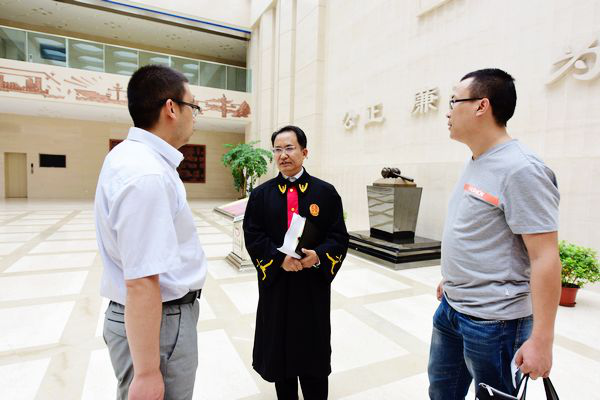A judge focuses on spirit of law
"He let us repeatedly discuss the case to thoroughly understand the spirit of the law and think over all influence that a ruling has on society," said Wen Bao, president of the first hearing and supervision tribunal of Qinghai Supreme People's Court. He was referring to Wu Maodan, vice-president of Qinghai Supreme People's Court.
 |
|
Wu Maodan discusses a case with litigants. [Photo/People's Court Daily] |
In view of the reality of Qinghai province where many religions, ethnic groups and cultures coexist, Wu demanded judges take various factors into consideration in hearing a case, uphold all people's equality before the law and appreciate different perspectives. Economic interests and ethnic values, for example, shouldn't influence the uniform application of law, and are not alone determinative, but they must be recognized.
During Wu's three-year-stay in Qinghai, the province was promoting the pioneering circular economy construction, ecological civilization and ethnic unity and progress.
Along with social and economic development came more frequent collisions between the perspectives of different parties. Many disputes arose based on conflicting social views, and retrials seeking to apply different social views became a new focus.
Commenting on Wu, Yang Zhijian, president of the second hearing and supervision tribunal of Qinghai Supreme People's Court, said that Wu instructed other judges by his own behavior and deeds and increased the credibility of evidence. "I think what he did is the prerequisite of retrial quality," Yang said.
Once, in a contract dispute about the engineering in a building construction project, Wu required other judges to hold six different panel discussions to thoroughly understand the case. That's because, despite availability of sufficient evidence, there was controversy over how to understand and apply the law.
"After being judges for years, many had developed the habit of simply paying attention to the case while ignoring other factors behind the law. Wu encouraged us to meet collegiately time after time to fully grasp the spirit of the law and repetitively weigh the influence that a ruling has on society," said Wen. For Wen, handling a case is no longer simply a process of applying rules and regulations.
